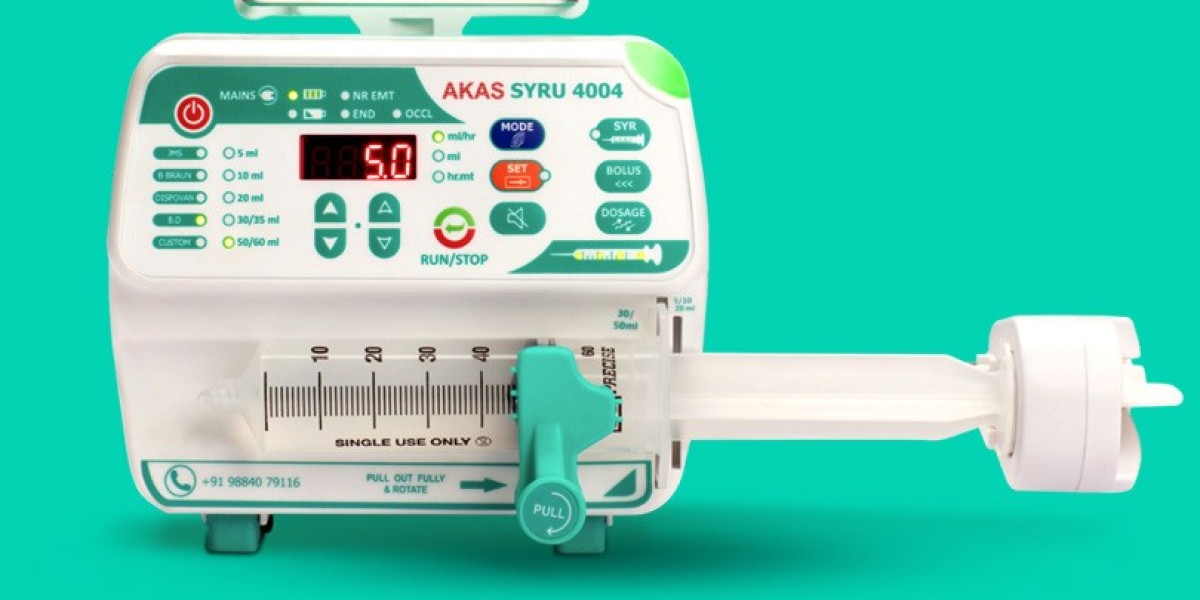The advancement of medical technology has significantly enhanced patient care standards across the world.
Among the most vital tools ensuring patient safety in critical care settings is the syringe pump.
This device plays an essential role in delivering medications with high precision, directly impacting treatment outcomes.
Critical care units demand consistent, controlled, and accurate medication administration.
The syringe pump is specially engineered to meet these needs by maintaining a stable flow rate.
In emergency cases, such precision can often mean the difference between life and death.
Hospitals and medical institutions around the world rely on syringe pumps for various applications.
These include anaesthesia, chemotherapy, neonatal care, and chronic disease management.
Such broad utility underscores their importance in every modern healthcare system.
In intensive care units (ICUs), patient conditions can change rapidly and unpredictably.
The use of a syringe pump ensures that vital medications such as vasopressors and inotropes are delivered continuously.
This continuity helps stabilise patients and supports medical teams in managing critical events effectively.
Paediatric and neonatal care requires the utmost delicacy and precision in drug delivery.
Syringe pumps allow healthcare providers to administer micro-doses safely, minimising the risk of complications.
For premature infants and vulnerable children, every millilitre matters profoundly.
Cancer treatment protocols often involve administering potent medications over prolonged periods.
Here, the syringe pump offers unparalleled control, reducing the side effects linked to dosing errors.
Patients undergoing chemotherapy benefit from steadier infusions, contributing to better treatment tolerability.
Operating theatres around the world integrate syringe pumps into anaesthesia management systems.
Their use ensures the precise delivery of anaesthetic agents throughout surgical procedures.
This precision contributes to safer surgeries and smoother post-operative recoveries.
The rise of home healthcare services has further broadened the role of syringe pumps.
Chronic disease patients now receive complex drug regimens from the comfort of their homes.
Portable syringe pumps provide them with independence while maintaining clinical-grade care standards.
With healthcare systems under pressure, efficiency in medication administration becomes even more critical.
Modern syringe pumps come equipped with smart features such as programmable infusion rates and alarms.
These innovations enhance workflow efficiency and reduce the workload on nursing staff.
Global healthcare challenges require medical equipment that is durable, adaptable, and user-friendly.
The latest generation of syringe pumps is designed to perform reliably even in resource-constrained environments.
This reliability ensures that hospitals across diverse settings can uphold high standards of patient care.
Ensuring standardisation across hospitals and regions is vital for global health collaboration.
Syringe pumps today adhere to stringent international quality and safety regulations.
Compliance with these standards builds trust among healthcare providers and strengthens patient safety initiatives.
Technology integration has transformed the capabilities of the modern syringe pump.
Features such as wireless connectivity, remote monitoring, and data logging are now commonly available.
These improvements offer enhanced oversight for clinicians and contribute to comprehensive patient records.
The expansion of mobile and field hospitals has highlighted the versatility of syringe pumps.
Their compact design, battery operation, and ruggedness make them indispensable in disaster response scenarios.
When infrastructure is limited, the syringe pump ensures continuous life-saving drug delivery.
Training healthcare personnel on the use of syringe pumps is fundamental for patient safety.
Leading manufacturers offer comprehensive user manuals, training modules, and ongoing support.
Empowering clinical staff with the right knowledge optimises the effective use of these critical devices.
Global demand for syringe pumps is projected to increase significantly in the coming years.
Ageing populations, the rise in chronic diseases, and expanding healthcare access all drive this growth.
Manufacturers must respond by delivering innovative, reliable, and accessible solutions.
Sustainability is also becoming a core concern in medical device manufacturing.
Environmentally responsible syringe pumps with recyclable materials and energy-efficient designs are gaining traction.
Hospitals worldwide are increasingly seeking suppliers that align with eco-friendly practices.
Selecting the right syringe pump supplier involves assessing product quality, service support, and compliance certifications.
Hospitals should seek partners with a proven track record of excellence and global reach.
This ensures continuity of care, reliable servicing, and up-to-date technological offerings.
Looking ahead, integration with broader hospital systems like Electronic Health Records (EHRs) will become standard.
The smart syringe pump will not only deliver medications but also enhance clinical decision-making.
Such integration will pave the way for more personalised and data-driven patient care models.
In conclusion, syringe pumps play a pivotal role in ensuring safe, accurate, and efficient drug delivery worldwide.
Medical institutions seeking trustworthy partners for critical care solutions can turn to Akas Infusion.
Akas Infusion manufactures world-class drug delivery devices, including volumetric pumps and syringe pumps, trusted globally for superior quality and reliability.c









